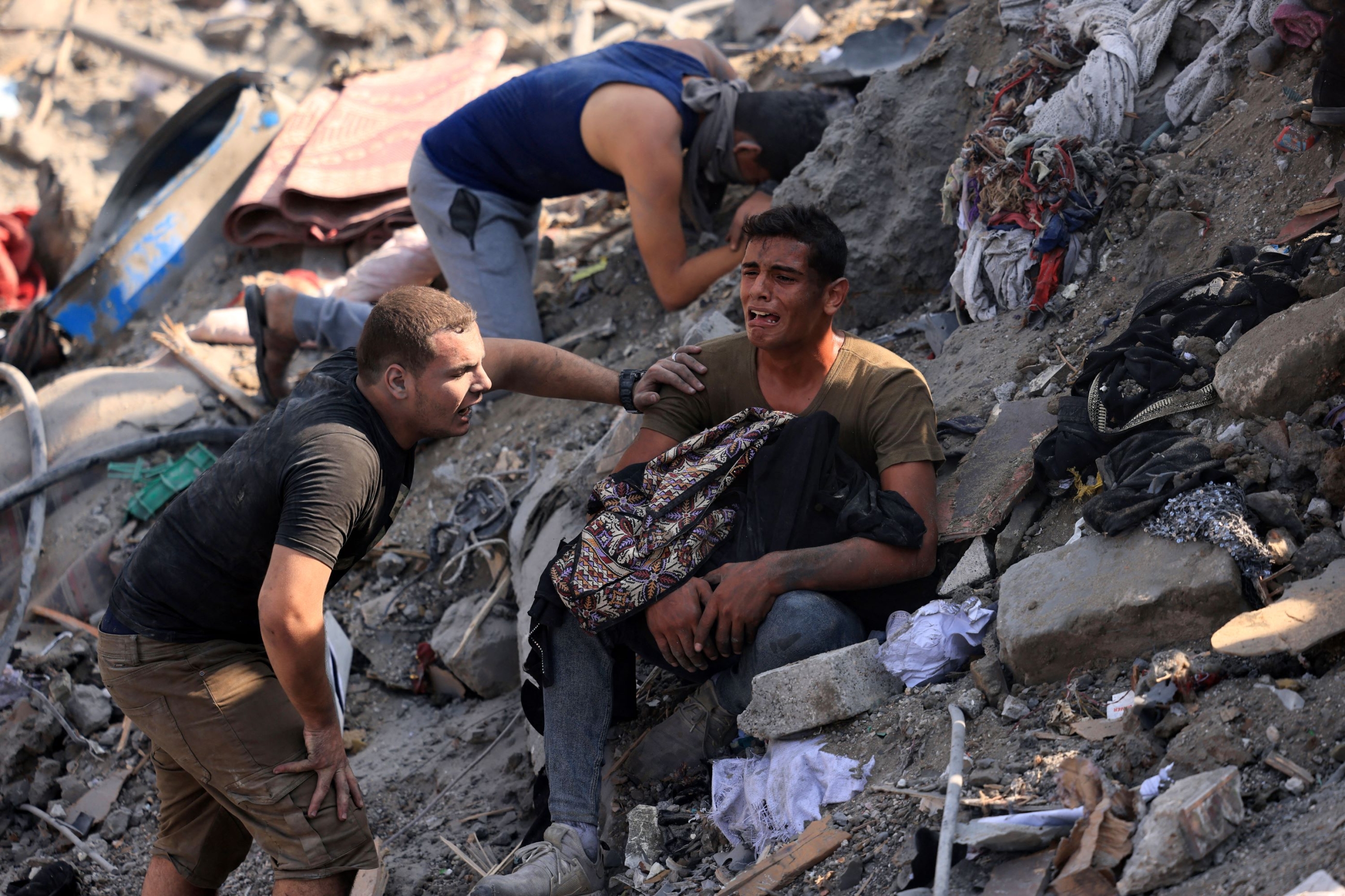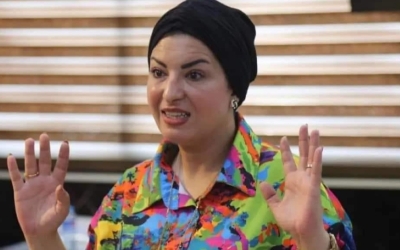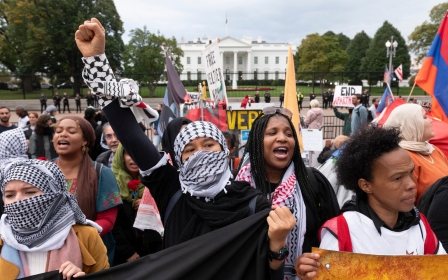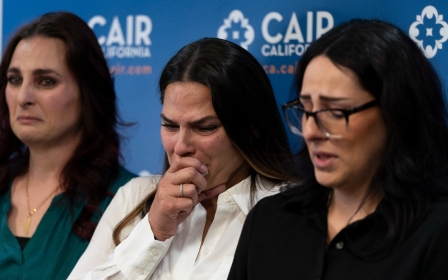Israel-Palestine war: More than 9,000 dead in Gaza as Netanyahu vows 'nothing will stop us'

More than 9,000 people have been killed by the Israeli military in the Gaza Strip, according to the enclave's health ministry, as Israel's prime minister warned on Thursday "nothing will stop us".
Air strikes destroyed another Palestinian residential block on Thursday, this time in the crowded Bureij refugee camp in the central Gaza Strip.
The civil defence spokesman in Gaza told Al Jazeera they had recorded the bodies of 15 people, while dozens more are feared dead and wounded under the rubble.
An Israeli air strike also killed a Palestinian journalist along with several members of his family in southern Gaza, according to local media.
Mohammad Abu Hattab, a reporter for Palestine TV, was killed by a strike on his home in Khan Younis on Thursday, Wafa news agency reported. Eleven members of Abu Hattab's family were killed too, including his wife, son and brother, the report added.
New MEE newsletter: Jerusalem Dispatch
Sign up to get the latest insights and analysis on Israel-Palestine, alongside Turkey Unpacked and other MEE newsletters
Throughout Thursday, Hamas' armed wing, the Izz al-Din al-Qassam Brigades, said its fighters were battling Israeli forces in several areas on the outskirts of Gaza City.
With anger mounting across the region at the month-long attack on Gaza, Bahrain's parliament announced a downgrade of its relations with Israel, the first of the Abraham Accords signatories to take such a step.
Despite the increasing international outcry, Israeli Prime Minister Benjamin Netanyahu said Israel would continue pressing its attack.
Netanyahu told soldiers the army was "already [at] more than the gates of Gaza City" and that despite the death of at least 16 Israeli soldiers in Gaza, they were "making progress".
"We also have painful losses, but I want to make one thing clear - nothing will stop us," he said.
Rise in settler attacks
Attacks by Israeli settlers across the occupied West Bank have been increasing in intensity alongside Israel's bombardment of Gaza.
On Thursday, a settler rampage through the West Bank village of Deir Sharaf left Palestinians trapped inside their homes.
Follow our live blog for all the latest on the Israel-Palestine war
Shadi Abu Halawa, the head of the village council, told Middle East Eye the attack began in the afternoon when settlers entered the village from the western side, an area where Israeli soldiers are permanently present.
According to Abu Halawa, dozens of settlers joined the rampage under the watch of Israeli troops, attacking 20 homes, throwing stones, and setting fire to at least four vehicles.
"We could not reach the area because it was surrounded by soldiers and settlers," Abu Halawa told Middle East Eye.
"But we see columns of smoke rising after the burning of vehicles and we hear the screams of the people, especially the children."

A spokesperson for the Palestine Red Crescent Society said his organisation had received a report that a group of children were trapped inside a warehouse belonging to a bakery and suffered from suffocation as a result of soldiers firing gas bombs and teargas.
"There are 20 cases of suffocation that we were able to deal with, but there are other cases we were unable to reach," he told MEE.
"Until this moment, there are children still stuck there."
In occupied East Jerusalem, Israeli police arrested a number of Palestinians from Gaza who were accompanying patients in a hospital.
A source told MEE those arrested were Palestinians from Gaza who came to Jerusalem on Israeli-issued permits to accompany patients from the besieged enclave.
Siraj Abu Arafa, a lawyer at the Jerusalem-based Wadi Hilweh Information Center, said 12 people were arrested, including "women, young men and a boy".
Local media said those arrested had their permits revoked after the war erupted on 7 October. Haaretz reported that one of the detainees was the sister of a member of the Izz al-Din al-Qassam Brigades, the military wing of Hamas.
Police also summoned the deputy director of the hospital for questioning.
Bahrain diplomatic break
In response to Israel's assault, Bahrain's parliament said the kingdom would be downgrading diplomatic relations with Israel.
It marks the first declared break with Israel by a signatory to the Abraham Accords, the agreement brokered by former US President Donald Trump in 2020 that saw Bahrain and the UAE - later followed by Morocco and Sudan - normalise relations with Israel.
A spokesman for the Council of Representatives, the country's lower legislative house, said the ambassador to Israel had been withdrawn, while economic cooperation with the country would also be put on hold.
"This is a confirmation of the historic Bahraini position in support of the Palestinian cause and the legitimate rights of the fraternal Palestinian people, which has been previously declared by His Majesty the King at conferences and events," the statement read, referring to Bahrain's King Hamad bin Isa Al Khalifa.
'The demand of the people is for the normalisation deal to end and for the population to have a say in government and foreign policy'
- Maryam Alkhawaja, Bahraini campaigner
Bahrain confirmed late on Thursday that its ambassador to Israel had returned home and the Israeli ambassador in Manama had left "a while ago".
Giorgio Cafiero, CEO of Gulf State Analytics, told MEE that regardless of the direct impact of parliament's announcement, it reflected how firmly Arab populations still backed the Palestinian cause in spite of their governments' diplomatic shifts.
Any move away from Israel on the part of Bahrain and other Abraham Accord countries was, therefore, about "catering to domestic and regional attitudes" and staving off unrest.
"Given the potential for the Palestinian issue to mobilise citizens to hold protests in countries such as Bahrain, some Arab governments are nervous because protests held in solidarity with the Palestinians can potentially shift into protests that challenge the government’s legitimacy, especially when questions about that government’s relationship with Israel and the US become more central," Cafiero said.
Maryam Alkhawaja, a Bahraini human rights activist living in exile in Denmark, also said she understood the move was largely an attempt to calm reactions inside Bahrain, and pointed out that a number of people had recently been arrested in Bahrain for taking part in pro-Palestine activism.
"The demand of the people is for the normalisation deal to end and for the population to have a say in government and foreign policy, not these minuscule measures," Alkhawaja told MEE.
Unconditional support
US Vice President Kamala Harris reiterated the administration's unconditional support for Israel's war in Gaza ahead of US Secretary of State Antony Blinken's visit to Israel on Friday.
"We are not going to create any conditions on the support that we are giving Israel to defend itself," Harris told a news conference on Thursday during her visit to the UK.
The White House said on Thursday that it is exploring the idea of "pauses" in the Israel-Palestinian conflict to help civilians in Gaza, according to national security spokesperson John Kirby as the US managed to evacuate 74 dual US citizens out of Gaza.
Secretary Blinken said on Thursday that Palestinian civilians have continued to bear the brunt of the conflict in recent days and the issue will be raised during his trip to Israel.
"We will be talking about concrete steps that can and should be taken to minimise harm to men, women children in Gaza," he said. But the US on Thursday maintained its opposition to a ceasefire, saying it would benefit Hamas.
Blinken will be visiting Israel, Jordan and Turkey during his visit to the region.
The US House of Representatives also passed a plan to provide $14.3bn in aid to Israel on Thursday, despite Democrats in the Senate saying it had no chance of passing, and the White House promising to veto it.
The plan passed by 226 to 196, with mostly Republicans voting in favour and Democrats voting against. It was the first major legislation to be brought forward under new Republican Speaker Mike Johnson.
Middle East Eye delivers independent and unrivalled coverage and analysis of the Middle East, North Africa and beyond. To learn more about republishing this content and the associated fees, please fill out this form. More about MEE can be found here.




